The 20 Best Sports Films Of All Time Ranked
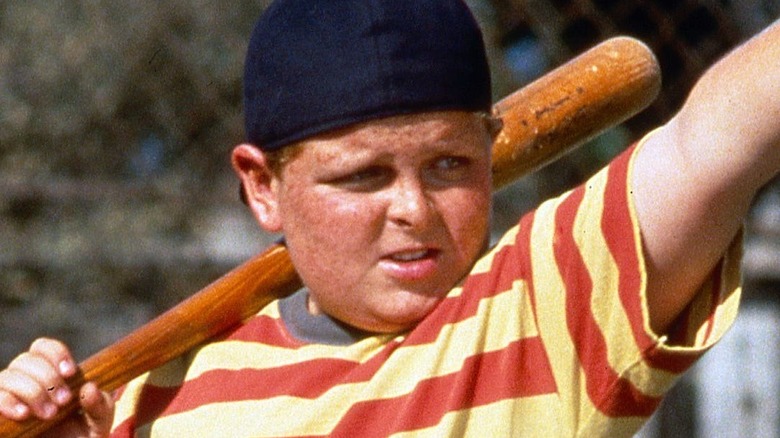
Movies about sports are essentially genetically engineered to be feel-good stories. Although the reality of professional sports is that a very small group of elite athletes tend to win over and over again, sports film fantasies favor the underdogs. At the movies, we see teams of misfits continually beat the odds, overcoming obstacles that would cause individuals with less fortitude to stumble. And although we tend to think of the sports film as adhering pretty closely to a specific formula, there's actually a surprising amount of variety to be found, both in the types of sports that are covered, and how they are approached.
But despite any deviations from the traditional path, there's one moment in sports movies that is prized above all others: the inspirational sequence, when all the hard work of the intrepid athlete pays off and they succeed, even if it's a metaphorical victory instead of a literal one. That's what the sports movie is all about: a single moment that makes you feel like you could run straight up a mountain.
Cool Runnings
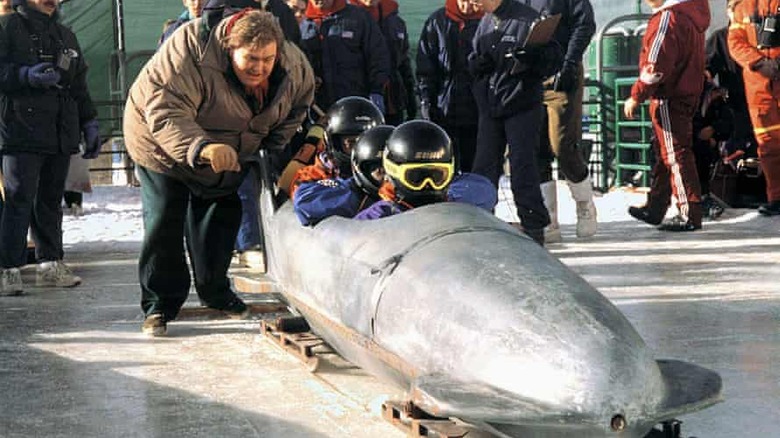
There are some concepts that are just delightful in their absurdity. A Jamaican bobsled team, for example -- a sport utterly dependent on snow and ice being mastered in a country with a tropical climate. That's really all there is to "Cool Runnings." It's a one-joke movie, but the joke is funny, and it's a comedy that luxuriates in a certain good-natured vibe rather than trying to make you laugh uproariously at every turn.
"Cool Runnings" centers around a Jamaican sprinter who fails to qualify for the Olympics and, interested in the athletic competition and not so much bothered by what event he participates in, recruits a disgraced ex-bobsledder (John Candy) to train him and his fellow athletes. "Cool Runnings" is a pretty fantastic fish out of water story, made all the more enjoyable because it (mostly) actually happened (there was an actual Jamaican bobsled team, but their inspirational final run was somewhat less significant since they were already out of medal contention at that point, and despite the tropical climate in the Caribbean, they weren't the only country from the region to field a bobsled team -- both the Netherlands Antilles and the US Virgin Islands competed that same year).
Bring It On
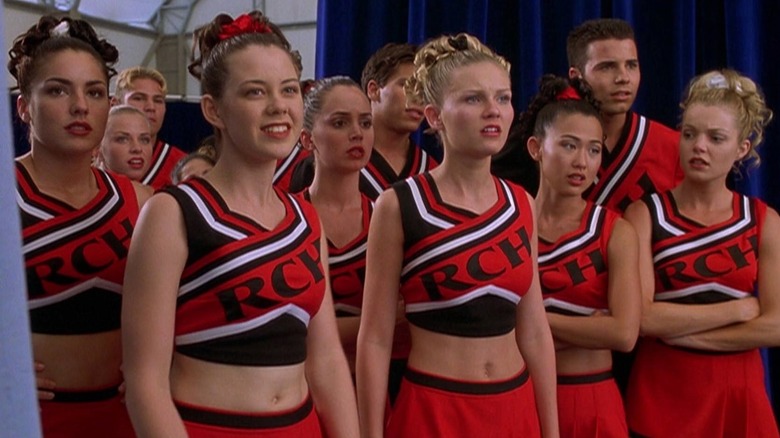
Please do not attempt to argue that "Bring It On" isn't a sports movie. You will lose. Yes, it's also a teen romantic comedy, but cheerleading is a sport, and it is taken incredibly seriously here. Rising senior Torrance (Kirsten Dunst) is elated to take over the role of cheer captain after the dictatorial former leader graduates. She is, however, considerably less excited when she learns that the cheerleading squad had been stealing routines from the objectively more talented East Compton Clovers, led by Isis (Gabrielle Union).
Horrorstruck, Torrance is determined to see her squad succeed on their own merits. Easier said than done. The cheerleading elements of "Bring It On" are excellent, but the film lives and dies on the friendship between Torrance and disgruntled gymnast-turned-cheerleader Missy (Eliza Dushku), as well as the burgeoning romance between Torrance and Missy's dreamy twin brother (Jesse Bradford). Beyond that, "Bring It On" addresses head on the subject of white athletes and artists "borrowing" liberally from their Black competitors, and getting credit for what is essentially theft.
Happy Gilmore
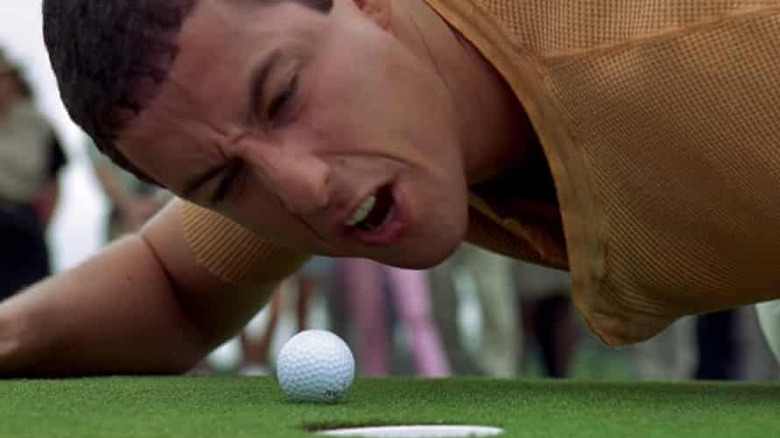
Adam Sandler and "sports movie" don't exactly seem like a natural fit (betting on sports, on the other hand, like he does in "Uncut Gems"? Absolutely). But the most endearing part of "Happy Gilmore" is that Happy is actually an absolute failure at his chosen sport.
Ever since he was a little kid, Happy was obsessed with hockey. He would try out for the minor leagues year after year, with no success. Aside from a wildly destructive slap shot and a short fuse (which, let's face it, has never exactly been a hindrance for hockey players), Happy isn't actually any good. It's only when he discovers golf that he finds an unexpected calling, although the famously demure and polite sport will need to get used to Happy's unconventional antics. This is one of the films that utilizes Adam Sander's shouty, over-the-top persona the best, putting him toe-to-toe against the smarmy, insufferable Shooter McGavin (Christopher McDonald.)
Whip It
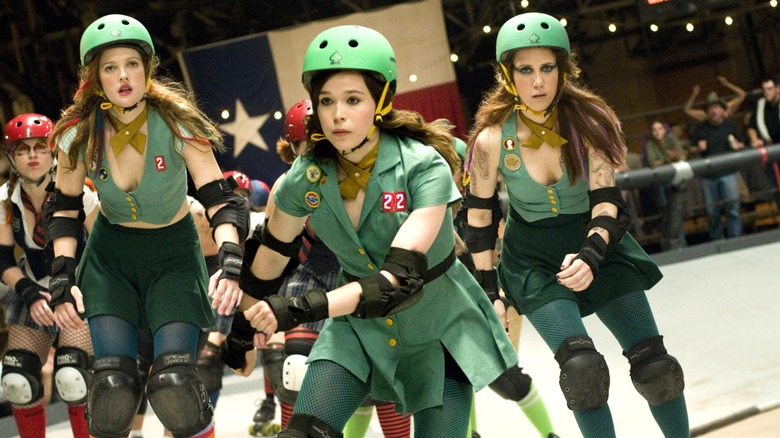
There are a lot of obvious choices for an actor turned first time director. A nice independent relationship drama, for example. "Whip It," the directorial debut from former child star and adult A-lister Drew Barrymore, is not exactly that. Instead, it's a vibrant celebration of one of America's most underrated team sports: the frenetic, frequently violent roller derby.
Bliss Cavendar (Elliot Page) has spent her entire life stuck in a world of "Drop Dead Gorgeous"-style beauty pageants in Texas. But when she stumbles upon roller derby, she is entranced. Although "Whip It" contains a familiar "endearing lead is torn between her family's expectations and following her own heart" narrative, "Whip It" feels like a breath of fresh air, embracing not just the protagonist's desire to find her passion, but serving as a testament to the bonds forged in the midst of one of the most brutal sports around.
The Karate Kid
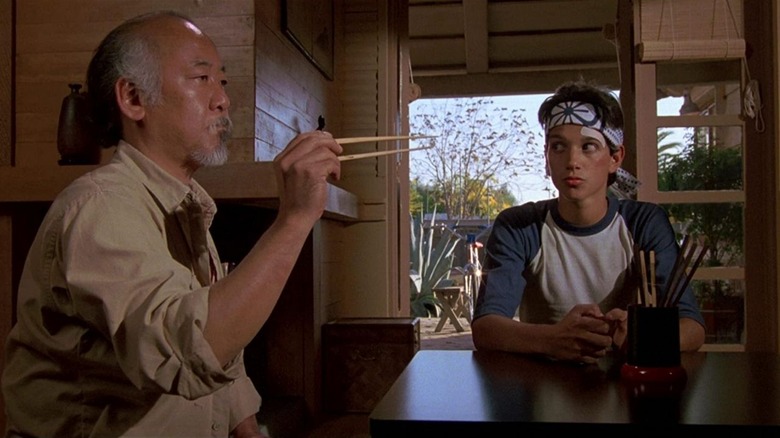
"The Karate Kid" is perhaps the ultimate underdog story: It literally has an underdog being trained by another underdog. When Daniel LaRusso (the baby-faced Ralph Macchio) moves to California from New Jersey, he quickly runs afoul of karate douche Johnny Lawrence (William Zabka) after committing the ultimate crime of flirting with Johnny's ex-girlfriend Alison (Elisabeth Shue). Faced with literal beatings, Daniel begins to train with the quiet, unassuming Mr. Miyagi (Pat Morita), who seems like a stiff breeze could knock him over, but is actually fully capable of taking out an entire swarm of assailants.
Mr. Miyagi's lessons are now iconic, with, "wax on, wax off" officially part of common lexicon. "The Karate Kid" is a likeable, endearing movie that has amassed an incredible fan base, generating three sequels, one remake, and, most recently, a delightfully addictive television show featuring Daniel and Johnny as full-grown adults training the next generation of karate kids.
I, Tonya
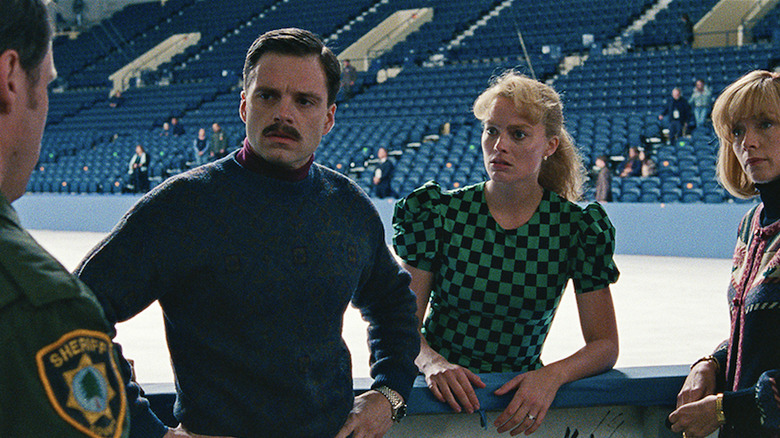
In a genre that focuses on the collaborative efforts of team sports, "I, Tonya" stands out for focusing on the individual. It stars Margot Robbie as Tonya Harding, a talented figure skater who was incredibly athletic but not as polished as many of the other women she competed against. "I, Tonya" allows Tonya to tell her side of the story, from the frequent abuse she faced from her domineering mother (Allison Janney, who won an Academy Award for her performance) as a child, her turbulent relationship with Jeff Gillooly (Sebastian Stan), and her alleged involvement in the infamous assault on Nancy Kerrigan at the 1994 US Figure Skating Championships.
Robbie creates an enigmatic heroine who is the definition of an unreliable narrator; in her direct addresses to the camera, she begs for the audience to empathize with her plight, but despite the adversity she's had to overcome, it's difficult to overlook the fact that Tonya always seems to find someone else to blame.
Remember The Titans
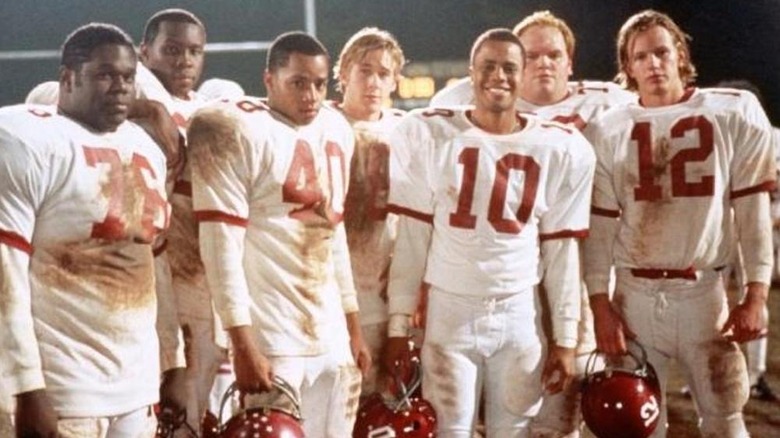
Racism and football go together like peanut butter and jelly. "Remember the Titans" makes an effort to dispel that notion by telling the heartwarming "based on a true story" tale of a championship football team grappling with the changes that integration will bring to their high school. Their new head coach (Denzel Washington) is a Black man, which infuriates the white players, who think their beloved coach (Will Patton) was passed over unfairly. Tensions, we can safely say, are at a fever pitch.
But through strict discipline, the two coaches are able to work together and make the Black and white players into a cohesive whole. The bonds that the players forge on the field impact their lives in ways they weren't expecting; when they return from training camp, they are (perhaps naively) stunned to realize that the rest of the world didn't necessarily change their beliefs while they were gone. "Remember the Titans" is steeped in maudlin sentimentality, but it is good at what it does, and when it wants to take you on an emotional journey, you shut up and go along for the ride.
Moneyball
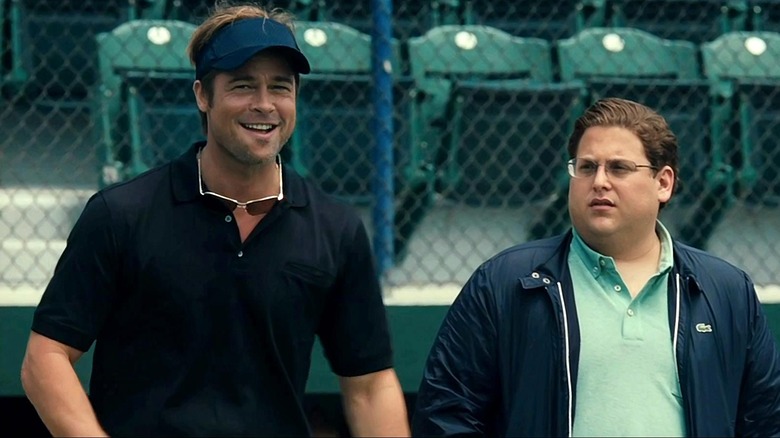
"Moneyball" combines one of the things Americans love most in the world (baseball) with the thing that Americans hate most in the world (being forced to do math). Although there aren't many actual sports scenes in the movie, "Moneyball" captures the reality of modern-day baseball without the nostalgic reverence that so many of its peers seem unable to avoid.
Billy Beane (Brad Pitt) is a former ballplayer and current general manager for the Oakland As. Not having as much discretionary spending as some of the wealthier teams, Beane has to come up with unorthodox ways to make the As competitive. With Ivy-Leaguer Peter Brand (Jonah Hill), Beane revolutionizes the time-honored practice of major league scouting by using statistical analysis to find players who command a much lower price tag than what they're worth. Look, using baseball to play on the sentimentalities of Boomers is easy. Making math exciting, the way that "Moneyball" does, is not.
The Mighty Ducks
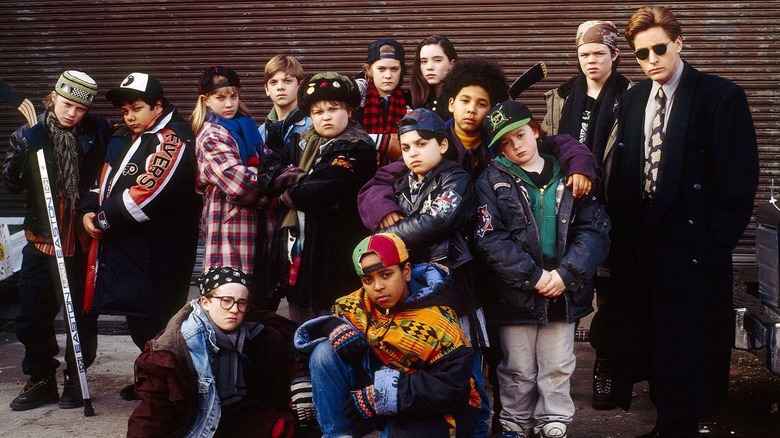
A weirdly prominent theme in '90s sports movies for kids is the perpetual class conflict, and nowhere is that more evident than in "The Mighty Ducks." When the extremely obnoxious lawyer Gordon Bombay (Emilio Estevez) was a kid, he was a Hawk, part of an elite youth hockey team that prized winning above all else. After missing a key penalty shot in a championship game, he was so distraught that he swore never to play hockey again. But when grown-up Bombay gets caught drunk driving, he is sentenced, ironically, to coach a PeeWee hockey team (this does not seem like the wisest punishment, from a child safety perspective, for a man who makes poor decisions when alcohol is involved).
The scrappy District 5 team is from a working class neighborhood. They can barely skate, and don't have access to the type of equipment that would let them compete with the other teams in their league. But inevitably, the Mighty Ducks win Gordon over. Also inevitably, he molds the Ducks into a really strong hockey team. And so the Ducks are born -- and they are an absolute delight to behold.
Chariots Of Fire
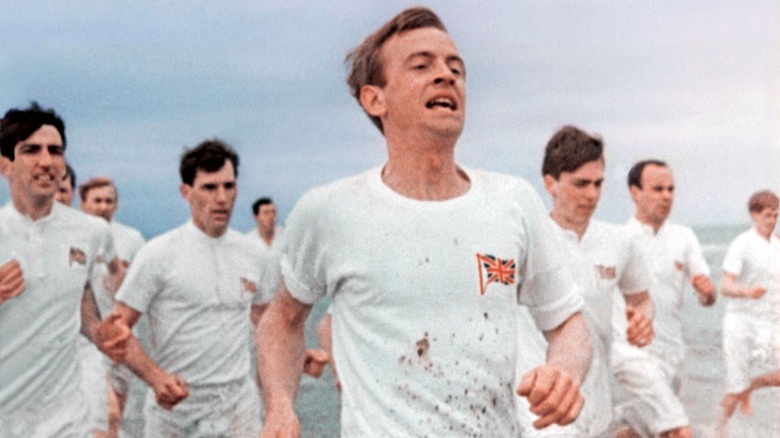
"Chariots of Fire" has a lot going for it, but first and foremost, we have to acknowledge the thing that makes it stand out from all other sports movies: that score. Honestly, the movie is good on its own, but without the incredible main theme by Vangelis, which fuses '80s electronica with a delicate piano and ended up winning for Best Score at the Academy Awards that year, it's just two guys running around a lot.
"Chariots of Fire" revolves around two young runners in the early 1920s: Harold Abrahams (Ben Cross), a Jew, and Eric Liddell (Ian Charleson), a devout Christian. They are rivals, but they're also connected by the impact their religion has on their ability to compete. Abrahams faces anti-Semitic discrimination at every level of competition, and Liddell is hindered by his inability to race on the Sabbath and other holy days. "Chariots of Fire" is a true story, one of the rare pre-'60s historical sports dramas, and one that manages to be just as effective as a traditional drama as it is a "sports movie."
Miracle
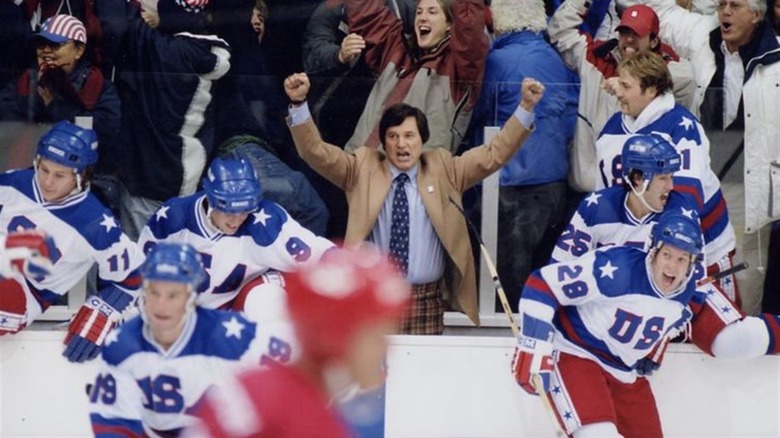
The biggest challenge for a film like "Miracle" is that it's so difficult to match the drama and intensity of the actual events it's based on. "Miracle" is the famous story of the American hockey team at the 1980 Winter Olympics in Lake Placid, which managed against all odds to defeat the team from the Soviet Union, which was heavily favored. It was termed the "Miracle on Ice" and was more than just a hockey win, it was an ideological victory against the hated Cold War adversaries.
To the credit of "Miracle," the movie captures the evolution of the US hockey team with a respect bordering on reverence, embodying the platonic ideal of an inspirational sports movie. As the team members go from individual players from different, often rival teams to a cohesive unit, it becomes impossible not to become incredibly invested in the outcome (even though most hockey fans would already be intimately familiar with their Cinderella story).
Bend It Like Beckham
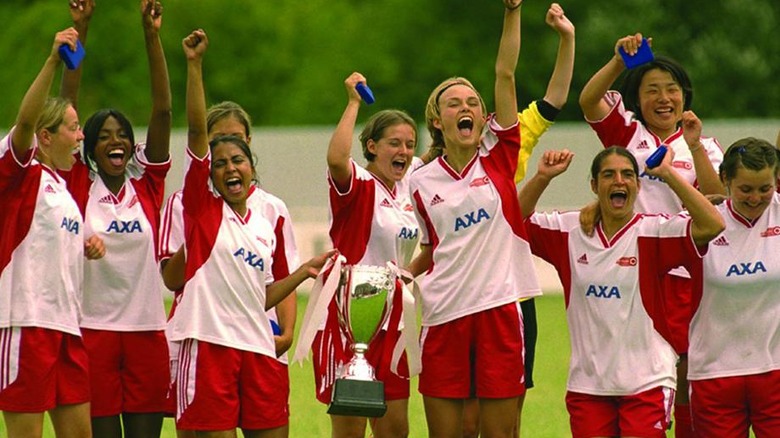
"Bend It Like Beckham" is a lot of things, but more than anything else, it's just incredibly joyful. Jess (Parminder Nagra) is a young Indian Sikh who has always been obsessed with football (of the English variety, of course), but now that she's becoming a woman, her mother insists that she give up so-called "boyish" hobbies and preparing herself for life as a proper young lady.
But Jess is really good at football, and she loves it, so despite being forbidden to play anymore, she joins a local women's team. That's where she meets Jules (Kiera Knightley), a white English girl whose mother is equally uninterested in her playing football. They forge an intense relationship -- honestly, if this film had been made a decade or two later, Jess and Jules would probably be more than friends. But straight or otherwise, their bond is the heart of the film, as both girls work together to follow their dreams, driven against all odds by their overwhelming love of the sport.
Fighting With My Family
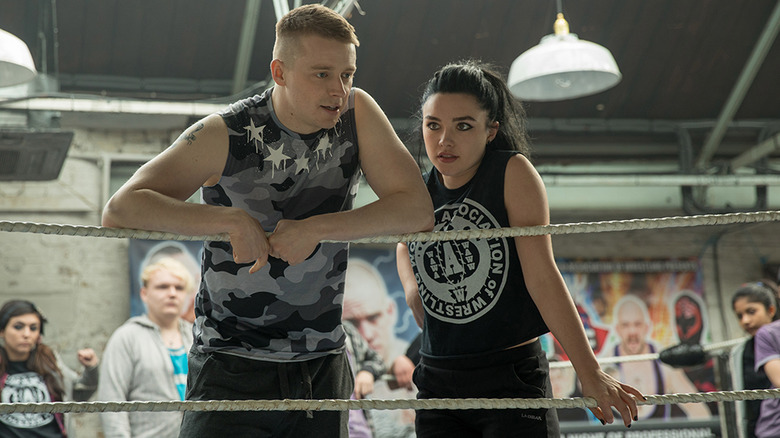
"Fighting With My Family" may be one of the most underrated and unseen sports movies. It is an utter delight. It focuses on the true story of an English working-class family of professional wrestlers, who are scraping by performing at local events in their hometown until their two children, played by Jack Lowden and Florence Pugh, get the opportunity of a lifetime when they're invited to audition for WWE.
There aren't a lot of films about professional wrestling, but this one treats the sport (we can probably all agree to skip the pedantic argument about whether it actually counts as such) with so much respect that it wins over audiences that have never watched a single minute of wrestling in real life. Pugh is incredibly engaging as the member of the family likely to go the furthest professionally, carrying her family's dreams on her shoulders as well as their unspoken resentment. Wrestling may be niche, but "Fighting With My Family" is a crowd pleaser with incredibly broad appeal.
The Pride Of The Yankees
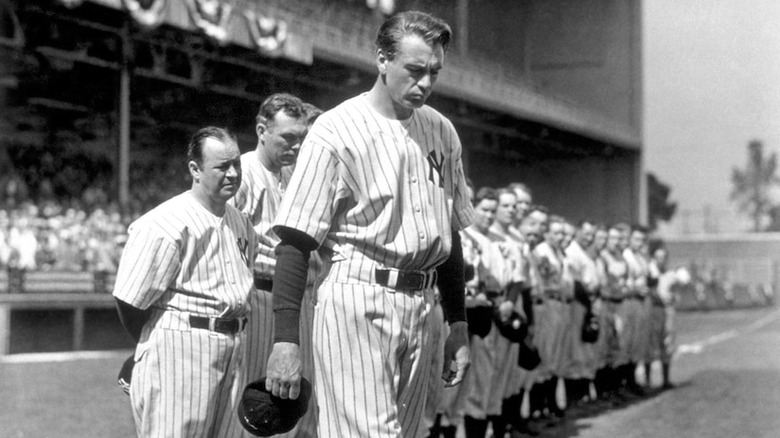
This one is an oldie, but it's pretty much iconic in the world of sports films. "The Pride of the Yankees" stars Gary Cooper as Lou Gehrig, the hero of the New York Yankees who would have his career cut tragically short by the onset of amyotrophic lateral sclerosis (ALS or, as it would popularly be called, "Lou Gehrig's Disease"). Gehrig himself died a year before the film's release, and two years after his last official game as a Yankee.
In many ways, "The Pride of the Yankees" is a fairly typical biopic detailing the life of one of baseball's most famous figures. But due to the reverence with which many moviegoers still held Gehrig upon the film's release, it is less of a straightforward biography, consumed with names and dates and endless details, and more of a loving tribute. And of course, the film's final line (a piece of Gehrig's farewell speech at Yankee Stadium) -- "Today, I consider myself the luckiest man on the face of the earth" -- has become one of the most moving moments in all of cinema.
The Sandlot
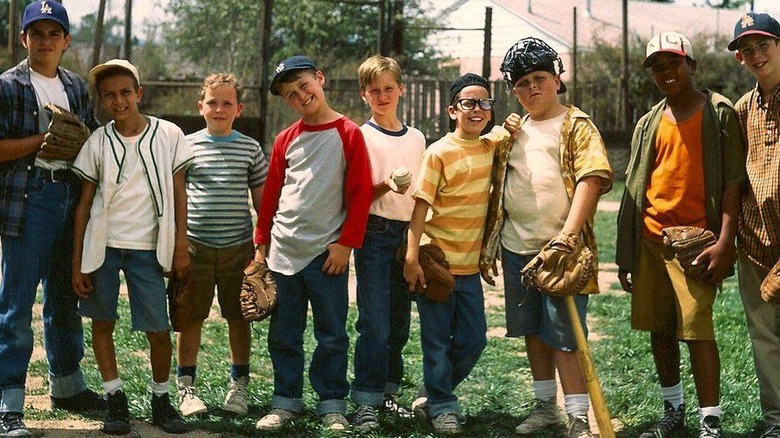
If you were a kid growing up in the '90s, "The Sandlot" was likely a big part of your childhood. In an era where Stranger Danger had been drilled into our heads since preschool and helicopter parents were becoming a major thing, it was almost disorienting to watch a film about a group of kids who were just let loose into the world and not expected back home until nighttime.
"The Sandlot" is about a preteen boy who moves to a new town and doesn't know anyone and lacks the ability to easily make friends. And yet, he falls in with a bunch of boys who play baseball every summer day in an abandoned sandlot next to a junkyard in their neighborhood.
"The Sandlot" does a really good job of balancing the pure "love of the game" attitude that Benny "The Jet" Rodriguez embodies with the occasional impulse of the entire gang to just be kids. They're a ragtag army of ball players, and when the film isn't focused on using weapons-grade nostalgia to tear down our emotional defenses, the youngsters win us over with their pure charm, each one having their own unique and well-defined personality.
Breaking Away
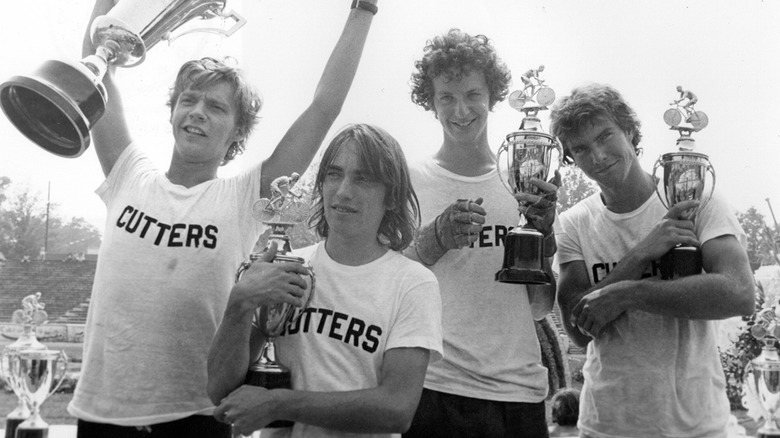
A delightful coming-of-age story, "Breaking Away" is about a teenage boy, Dave (Dennis Christopher), who falls so in love with cycling that he decides to construct his entire personality around it. He's obsessed with Italian cyclists (who he believes to be the best), and even pretends to be an Italian exchange student to woo a pretty girl from the local college.
He and his friends are one year out of high school, and have settled uneasily into the life of "townies"; they live in a university town, but feel self-conscious around their well-heeled peers, and are uncertain as to what they'll end up doing long-term. The answer for Dave, though, is simple: He wants to be a professional cyclist. "Breaking Away" has a fantastic ensemble cast, many of them early enough on in their careers that this would be a breakout role for them: Dennis Quaid, Daniel Stern, and Jackie Earle Haley. As an expression of pure, unadulterated love for a sport, "Breaking Away" is unmatched.
Love & Basketball
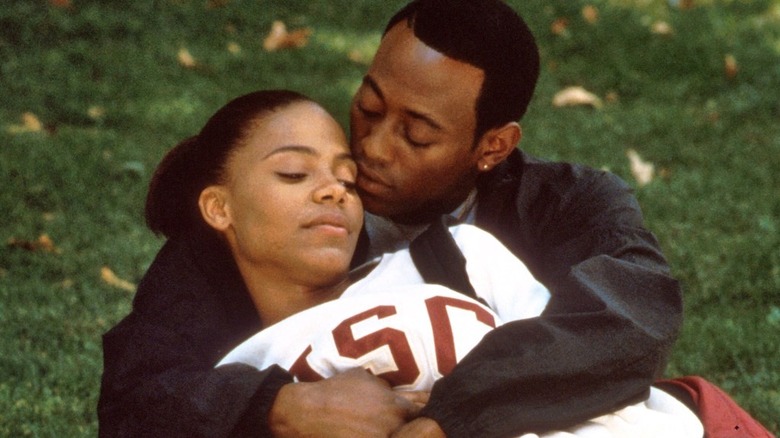
"Love & Basketball" is one of the few sports movies that also functions as a real love story. Sure, plenty of these films have a protagonist with a romantic interest, but relationships are usually a mere side plot. By contrast, "Love & Basketball" entwines the intimacy of its two protagonists and their ambitions in a way that is wholly unique.
Monica (Sanaa Lathan) and Quincy (Omar Epps) are inseparable as children, bonded by their love of basketball and their dreams of becoming professional players. As they grow older, their friendship turns into romance, but is threatened by the disparity of their treatment in the sport based on their genders.
Many sports movies touch on this issue, but "Love & Basketball" really explores what it looks like when a talented girl is given fewer opportunities than her male counterpart: Quincy's abilities are recognized early and encouraged, while Monica has to fight for a chance to be taken seriously. "Love & Basketball" is director Gina Prince-Bythewood's debut film, and her work here is understated but extraordinary.
Field Of Dreams
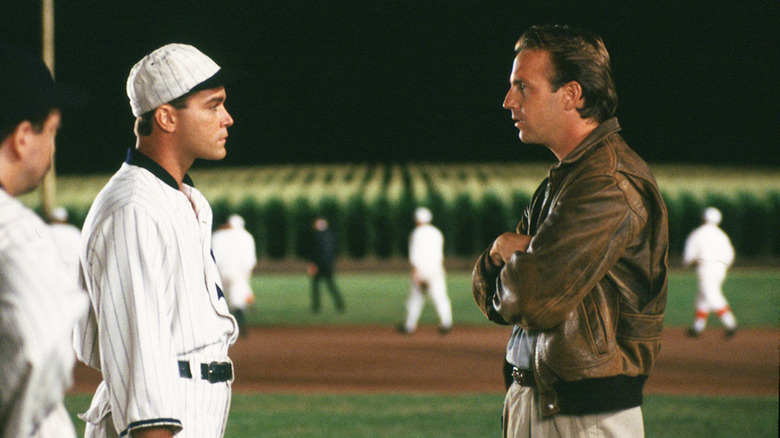
If you're a son, you'll probably end up crying at "Field of Dreams." If you're a dad, you probably will too. And really, even if you're not a son or dad type person, chances are you'll get a little emotional anyway. It's just that kind of movie.
"Field of Dreams" stars Kevin Costner as a reluctant farmer struggling to make ends meet in a career that he has no background and even less interest in. Suddenly, he hears a voice that convinces him to plow out his cornfield and build a baseball diamond. Before too long, ghosts show up. But fear not -- they're not scary ghosts, they're just a bunch of dead baseball legends who want another chance to play.
Throughout the strange and unconventional story, with ghosts and time travel and mysterious disembodied voices, "Field of Dreams" is tinged with a sense of melancholy that defies the expectations of a sports movie in general, as well as what a late '80s audience would have expected from a Kevin Costner vehicle. "Field of Dreams" is not really about baseball at all. It's about a longing for the past, for a bygone era when our own youthful ideals haven't yet given way to pragmatism, and for relationships with the parents that we never really knew.
The Bad News Bears
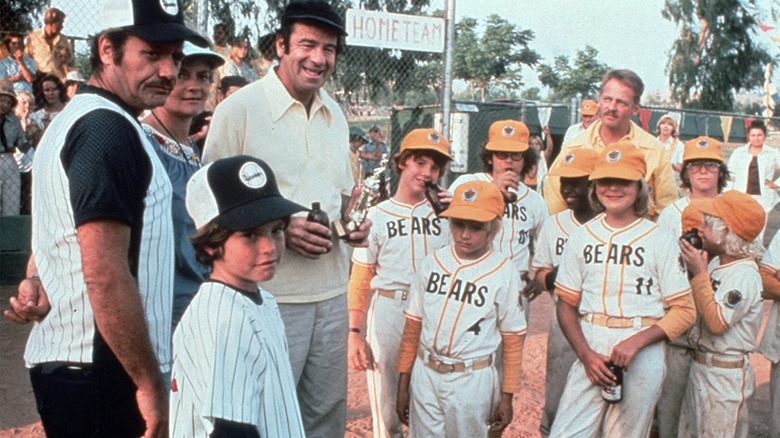
There are so few films in the world that show kids as the foul-mouthed little monsters they are fully capable of being. Thankfully, "The Bad News Bears" is one of them. Outrageously offensive at times, "The Bad News Bears" features a bunch of rough-and-tumble kids acting like a lot of kids do: pushing boundaries, testing limits, and experimenting with politically incorrect language that would likely bar them from taking public office in the future.
Essentially, the plot is this: A rich jerk wants his kid's Little League team to win for a change, so he hires an ex-ballplayer (and a barely-functioning alcoholic) to coach a bunch of misfits. And although the coach is initially in it for the money, he becomes attached to the kids in his own curmudgeonly way. The kids get better. But you know the truly subversive part of "The Bad News Bears?" They don't end up winning. They figure out how to play baseball, and they work together, and they learn all those lessons that you inevitably get in any sports film -- and it still isn't enough. Bold. Incredible. Chef's kiss.
A League Of Their Own
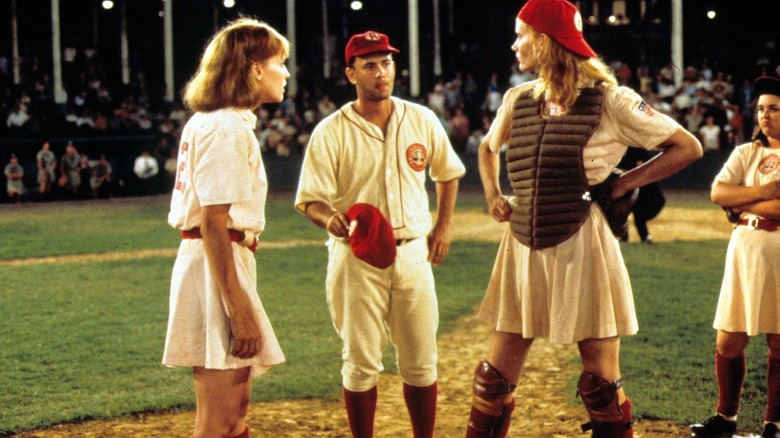
To say that "A League of Their Own" is in a league of its own is dumb and cliché, but it's also true, okay? The setting is '40s America, when, in the midst of World War II, the major leagues have suddenly cottoned on to the fact that when all the young baseball players go to war, they're going to have a tough time selling tickets to games. Enter the All-American Girls Professional Baseball League, which is designed to be a girly show with a thin veneer of athleticism to make it respectable, but quickly evolves into something spectacularly popular and legitimate in its own right when everyone realizes that women can actually play baseball.
Penny Marshall in the late '80s and early '90s truly could do no wrong, and "A League of Their Own" is a testament to that. It features a tremendous ensemble cast of women who are so well-rounded and interesting that they could each be the lead in their own film and we would 100% watch it. Funny and emotionally resonant, "A League of Their Own" captures the hearts of anyone who watches it.
Read this next: Five Sports Movie Commentaries Worth Listening To
The post The 20 Best Sports Films of All Time Ranked appeared first on /Film.
